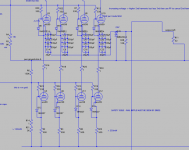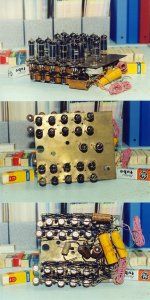Somewhat like this, done circa 1960. 20X 6AQ5 in a stacked PP arrangement.
It used two regulated 300V lab supplies. The output was nominally at zero volts. But not DC coupled.
And was used to drive a 120V synchronous motor. So NFB sampled output current
& adjusted the output voltage up as frequency increased. Was capable of >100W.
Today can be done with far less complication using FETs. 😀
It used two regulated 300V lab supplies. The output was nominally at zero volts. But not DC coupled.
And was used to drive a 120V synchronous motor. So NFB sampled output current
& adjusted the output voltage up as frequency increased. Was capable of >100W.
Today can be done with far less complication using FETs. 😀
Attachments
Remember that he intends those circuits for conceptual educational purposes only, and not as schematics to be built.Turns out John Broskie has published a lot of such circuits.
When he has developed and tested circuits, often he offers a PCB or kit.
See Ch. 11 here for more general theory of DC coupled tube amplifiers.
http://www.nj7p.org/Manuals/PDFs/Books/MIT-Radiation-Lab-Series-V18-Radar-Engineering.pdf
Last edited:
Looks like copyrights are of little value now. This book was reproduced by Audio Amateur Press in year 2000.
And sold for 40 USD. I bought a copy when the book first became available.🙂👍
Here today we find the information given away free on the web.
I got my *** burned here on DIY about a year ago for posting some audio circuitry from ~60 yrs ago.
Looks like being reported depends on who posts. And who is looking. 👎
And sold for 40 USD. I bought a copy when the book first became available.🙂👍
Here today we find the information given away free on the web.
I got my *** burned here on DIY about a year ago for posting some audio circuitry from ~60 yrs ago.
Looks like being reported depends on who posts. And who is looking. 👎
The entire original MIT Radiation Laboratory series is in the public domain, and is over 70 years old.
https://www.febo.com/pages/docs/RadLab/
https://www.febo.com/pages/docs/RadLab/
Last edited:
I may be a sissy, but the thought of a failing tube amp output going to B+ wired directly to my head is not something I enjoy.This new HPA from Schitt touts an output stage that has no output transformer and no output capacitor between your headphones and the tubes. How can this be?
https://audioxpress.com/news/schiit-introduces-limited-edition-10-tube-dc-coupled-otl-tube-amplifier
I may be a sissy, but the thought of a failing tube amp output going to B+ wired directly to my head is not something I enjoy.
Indeed OTL needs some safety. An intermittent B+ short will sendup causing a high voltage through a coupling cap too yet the majority of commercial OTL amps uses a non X class to couple, less so a transformer unless it shorts over the insulation.
You could have a trip sensing overvoltage with a relay to short a B+ fuse between the tubes and the smoothing cap.
For a DC coupled Totem Pole output stage, if the bottom tube opens up, and you use a shorting relay to short the output to ground,
Then you just blew out the top tube too.
When the relay grounds the top tube output to ground, it just might take out its driver tube along with it.
Shock proofed, yes.
But you doubled, or tripled, the parts failure count.
Just my opinions
Then you just blew out the top tube too.
When the relay grounds the top tube output to ground, it just might take out its driver tube along with it.
Shock proofed, yes.
But you doubled, or tripled, the parts failure count.
Just my opinions
But what is the point of DC coupled output ? , since any audio amplifier have to linearly amplify from about 20Hz-20Khz only audio AC signals and not any DC component , by pure DC amplifiers is different story there output have to be DC coupled to load .
But what is the point of DC coupled output ? , since any audio amplifier have to linearly amplify from about 20Hz-20Khz only audio AC signals and not any DC component , by pure DC amplifiers is different story there output have to be DC coupled to load .
DC coupling output just removes the capacitor distortion and given the size of the caps used that means electrolytic.
Please do not look under the equipment panels of your favorite recording studio, especially if they:
Either use vacuum tubes (coupling caps, Oh My!),
Or use older solid state circuits (Electrolytic coupling caps, Oh My!).
Next, for the same vintage recordings, do not look to see how many transformers are used: microphones, preamps, production room monitor amplifiers that are used to properly tweak the sound, record cutter amplifiers, tape recorders, etc.
If you know the whole truth and worry about that sort of thing, you might not enjoy listening to recorded music anymore.
Or . . . you can sit back, listen, and enjoy.
It is all up to you.
Always remember to peel the Onion by starting with the outer layer.
P.S.
How many that use OTL amplifiers often measure the DC offset at different line voltages, temperatures, etc. when they are under load (Loudspeaker or Headphones; Not a load resistor).
Did you measure the voice coil offset caused by the amplifier DC offset? Do you know how much 2nd harmonic distortion that causes, or how much earlier the cone or diaphragm, in the same direction as the DC offset, now goes beyond the linear magnetic field?
A well known equipment reviewer wisely said: "Enjoy the Music".
Either use vacuum tubes (coupling caps, Oh My!),
Or use older solid state circuits (Electrolytic coupling caps, Oh My!).
Next, for the same vintage recordings, do not look to see how many transformers are used: microphones, preamps, production room monitor amplifiers that are used to properly tweak the sound, record cutter amplifiers, tape recorders, etc.
If you know the whole truth and worry about that sort of thing, you might not enjoy listening to recorded music anymore.
Or . . . you can sit back, listen, and enjoy.
It is all up to you.
Always remember to peel the Onion by starting with the outer layer.
P.S.
How many that use OTL amplifiers often measure the DC offset at different line voltages, temperatures, etc. when they are under load (Loudspeaker or Headphones; Not a load resistor).
Did you measure the voice coil offset caused by the amplifier DC offset? Do you know how much 2nd harmonic distortion that causes, or how much earlier the cone or diaphragm, in the same direction as the DC offset, now goes beyond the linear magnetic field?
A well known equipment reviewer wisely said: "Enjoy the Music".
Last edited:
To neutralize distortion of output coupling electrolytic cap just insert it inside of GNFB loop .DC coupling output just removes the capacitor distortion and given the size of the caps used that means electrolytic.
To neutralize distortion of output coupling electrolytic cap just insert it inside of GNFB loop .
True - GNFB is a servo control loop.
@6A3sUMMER true.
- Home
- Amplifiers
- Tubes / Valves
- How can a tube Amp have entirely DC coupled output?

